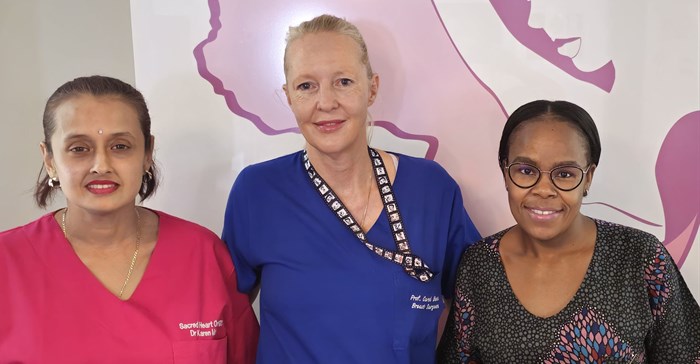
Related
Top stories






More news
















Ahead of World Cancer Day 2024 on 4 February, Africa’s first and only breast care centre of excellence has once more been recognised by the American College of Surgeon’s National Accreditation Program for Breast Centers (NAPBC). The centre - based at Netcare Milpark Hospital in Johannesburg - has had its accreditation extended until 2026.
“We heartily congratulate Professor Benn and her team for consistently upholding the highest standards in care for breast cancer treatment. Their relentless pursuit of excellence in advancing cancer care, aligning with international best practices and achieving remarkable milestones has placed the formidable team at the Netcare Milpark Breast Care Centre of Excellence at the forefront of breast cancer care globally,” says Cindy Aitton, head of Netcare’s Cancer Care division.
“Amid the stress of being diagnosed with breast cancer, a person should not have to worry about navigating various healthcare professionals at different facilities to confirm whether the treatment and care they are receiving is sound, safe and right for them,” says Benn, who founded the centre with Netcare in 2001.
Netcare Milpark Breast Care Centre of Excellence is one of just three breast centres outside the United States to achieve accreditation from the NAPBC, granted only to programmes that are demonstrably committed to providing the best possible standards of care to patients with breast cancer.
“I cannot give 100% to any programme, but [Netcare Milpark Breast Care Centre of Excellence] is the closest I’ve ever come,” was the powerful endorsement on the centre’s assessment from the NAPBC’s chief accreditor Toan Thien Nguyen from Florida.
The quality of care patients receive at the centre is continuously monitored and has been since it was first accredited in 2017. Every three years, the NAPBC conducts a site visit as part of its rigorous reaccreditation process.
“The multidisciplinary team approach is central to the NAPBC’s stringent requirements for the structure of care. Interdisciplinary collaboration provides the reassurance of various specialists and practitioners putting their heads together to carefully consider the options available for the most important person: the patient,” Benn says.
“This ensures each clinical decision is carefully weighed from multiple perspectives holistically, and this is proven to guide better outcomes.”
The services of the Breast Care Centre of Excellence are also represented at the breast units of Netcare Alberton, Netcare Linksfield, Netcare Olivedale and Netcare Park Lane hospitals through member specialists who are part of the accreditation.
Once again, the NAPBC hailed Netcare Milpark Breast Care Centre of Excellence as a prime example that would be incorporated into the NAPBC’s international best practices guideline to help empower other centres worldwide to serve their patients better.
Accredited units have to collect data and feedback on outcomes while ensuring high standards of care across 29 measures on an ongoing basis. NAPBC centres collate data to refine evidence-based processes to drive better care for patients at any stage of cancer.
“Both locally and globally, Prof Benn’s clinical leadership provides a blueprint for breast cancer units to aspire to. The warmth of the experienced cancer care team and the sense of community at the centre is a source of added comfort,” Aitton says.
“When accessing care at a NAPBC-accredited centre, a person is guaranteed comprehensive treatment, and Netcare Milpark Hospital offers the convenience of numerous state-of-the-art treatments available at the same facility.”
Breast-cancer treatment at the centre includes access to information on clinical trials and new treatment options, genetic counselling and psychosocial support, financial guidance, rehabilitation services, and survivorship care.
“We keep in touch with each person for life. We know from experience that you don’t go through an experience like supporting someone through breast-cancer treatment without developing a lasting relationship,” Benn says.
“In South Africa, we do unfortunately see the consequences of limited public awareness of breast cancer. We need to encourage open conversations about breast cancer.
"Self-examination is important too, however, regular mammograms remain the best way to detect breast cancer as early as possible. "
One in 27 women will be affected by breast cancer in her lifetime.